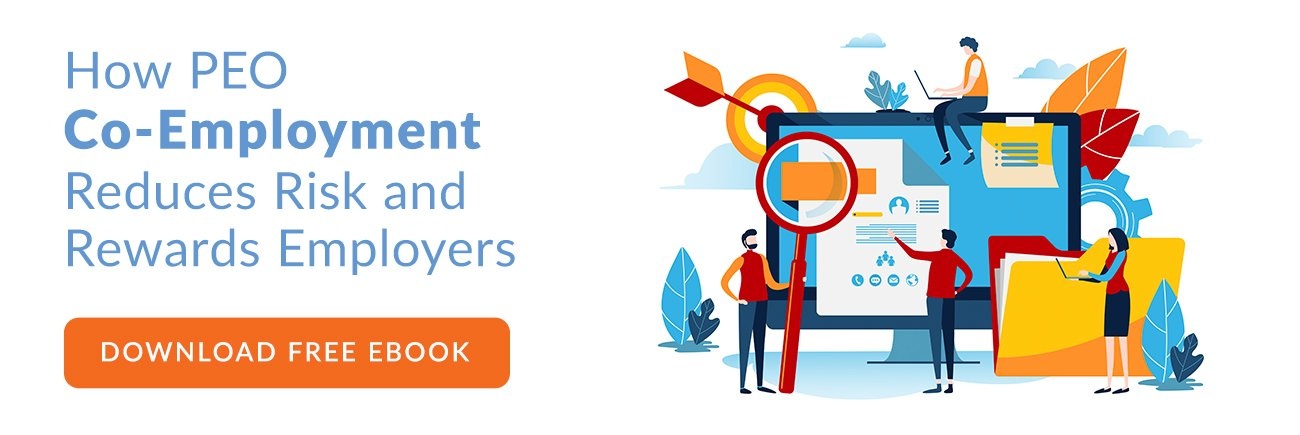The quest for efficiency and innovation is ceaseless. As an employer, steering the helm of your business demands leadership and the adept management of various administrative facets. That is where Professional Employer Organizations (PEOs) come into play.
A PEO is a firm that partners with companies to manage and streamline administrative tasks, including but not limited to payroll, employee benefits, and compliance management. This partnership allows business leaders to focus more intently on the core operations of their company, fostering growth and innovation without being bogged down by administrative hurdles.
At the heart of this collaboration lies co-employment, a unique arrangement where the PEO and the client company share responsibilities for the company's employees. This shared responsibility ensures a harmonious blend of control and expertise, allowing businesses to retain their autonomy while benefiting from a PEO's specialized services. Co-employment serves as a bridge, connecting your business to the benefits of a PEO partnership.
Will Co-Employment Lead to a Loss of Control?
Co-employment often raises concerns about potential loss of control over one's business. However, it's essential to understand that a well-structured co-employment relationship is designed to enhance, not diminish, the management and efficiency of your business operations. Let's explore this in detail:
- Preservation of Company Autonomy
-
- Retaining Control Over Daily Operations: Even with a co-employment agreement, business owners maintain complete control over the daily operations of their company. The role of a PEO is to provide support and expertise in areas like payroll and benefits administration, not to take over the business operations.
- Maintaining the Company's Unique Culture and Values: A PEO partnership doesn't alter the foundational elements of your company. The unique culture and values that define your business remain intact, with the PEO working to enhance these aspects rather than change them.
- Contractual Agreements
-
- Clearly Defined Roles and Responsibilities in the Contract: The co-employment contract clearly delineates each party's roles and responsibilities, ensuring no ambiguities about control and authority.
-
- Flexibility to Tailor the Partnership According to the Company's Needs: Co-employment agreements offer the flexibility to tailor the partnership to suit your company's specific needs and goals, allowing for a relationship that complements your business strategy rather than conflicting with it.
Co-employment is far from a loss of control. As you can see, it is just the opposite.
How Can a PEO Benefit My Business?
While the benefits of a PEO are vast, below are some of the most important ways in which a PEO can be a boon to your business:
- Cost-Efficiency
-
- Reducing Overhead Costs: By outsourcing administrative tasks to a PEO, you can significantly reduce the overhead costs of managing these functions in-house. This financial prudence can then be redirected to other vital business areas.
- Offering Economies of Scale: PEOs can provide smaller businesses with the kind of economies of scale usually reserved for larger corporations, especially regarding purchasing power for employee benefits, which can lead to substantial savings.
- Access to Better Benefits
-
- Facilitating Comprehensive Employee Benefits: Partnering with a PEO grants you access to a broader range of employee benefits, often at a more competitive rate. This not only enhances employee satisfaction but also helps in attracting top talent.
-
- Attracting Top Talent with Competitive Packages: A PEO can help you design attractive benefits packages that lure top talent to your company, giving you a competitive edge in the job market.
- Compliance Assistance
-
- Helping Navigate Complex Labor Laws: The world of labor laws can be a labyrinthine space. A PEO assists in navigating these complex terrains, ensuring that your business remains compliant and avoids potential legal pitfalls.
- Assisting with Tax Compliance: Tax compliance is another area where PEOs shine, offering expert guidance to help you meet all necessary tax obligations, thereby avoiding penalties and fostering a compliant business environment.
While these benefits are robust, they don’t answer one of the most critical questions about PEOs: How are they priced?
How Does a PEO Charge for Its Services?
The cost structure of PEO services can vary significantly, and choosing a model that aligns with your business's financial strategy is essential. Below are the various pricing models prevalent in the PEO industry:
- Low Price, Low Service (Payroll Processors)
-
- Single Task Outsourcing: This model primarily focuses on outsourcing payroll processing, often the most outsourced task. While it is the cheapest option, the return on investment (ROI) might not be substantial as it only covers a single aspect of HR responsibilities.
-
- Limited ROI: Businesses might find that the ROI is not as high when only one task is outsourced. However, it can offer intangible benefits like compliance assistance and customer support.
- High Price, High Service (National PEO Chains)
-
- Comprehensive Services: National PEO chains offer a wide array of HR administrative services, taking over many HR responsibilities, which can lead to substantial cost savings in various areas, such as internal HR salaries and benefits, health benefits costs, and workers' compensation costs.
- Cost Structure: These PEOs generally have a higher cost, charging based on a percentage of gross payroll or an ad-hoc per-employee, per-check basis. The costs can be significant, especially for businesses with higher payrolls.
- Low Price, High Service (Local PEOs)
-
- Cost-Effective Solutions: Local PEOs offer a balanced approach with substantial ROI without the high-cost model. They can provide services at prices comparable to payroll processors, leveraging their low overhead costs to offer competitive rates.
- Transparent Pricing: These PEOs often have a transparent pricing model with a fixed rate per employee, avoiding hidden costs and additional fees common with national chains.
How Does Partnering with a PEO Help Compliance Management?
Staying compliant with various labor laws and regulations can be a daunting task. Partnering with a PEO can significantly ease this burden, offering expert guidance and resources to help manage compliance effectively. Here's how a PEO can assist in compliance management:
- Risk Mitigation
-
- Developing Strategies to Minimize Workplace Risks: PEOs help craft strategies that help reduce potential risks in the workplace, thereby fostering a safer and more secure work environment.
- Implementing Safety Protocols: PEOs can help implement safety protocols that adhere to the industry standards, ensuring the well-being of the employees and minimizing liabilities.
- Regulatory Compliance
-
- Understanding Federal and State Labor Laws: PEOs have the expertise to help businesses comply with federal and state labor laws, avoiding potential legal complications.
-
- Industry-Specific Regulations: PEOs are adept at understanding and complying with industry-specific regulations, helping businesses stay compliant without having to delve deep into the nuances of these laws.
- Administrative Relief
-
- Handling Tax Compliance: PEOs offer assistance in managing tax compliance, helping businesses to meet their tax obligations accurately and on time, avoiding penalties.
- Streamlining HR Processes: By taking over many HR responsibilities, PEOs help streamline various processes, ensuring that the business operates within the legal frameworks and adheres to the necessary compliance standards.
As we move forward, we will delve into the intricacies of employee benefits management through a PEO partnership. Stay tuned as we explore how PEOs can enhance employee satisfaction and retention through comprehensive benefits administration.
How Does a PEO Handle Employee Benefits?
Procuring and administering affordable benefits remains a significant challenge for small and medium-sized businesses. This is where a PEO steps in, offering expertise and resources to manage these benefits effectively.
- Managing Health and Retirement Benefits
-
- Offering a variety of health insurance plans to cater to the diverse needs of employees.
- Administering retirement plans such as 401(k), ensuring employees have a secure future
- Coordinating Workers' Compensation
-
- Streamlining the process of workers' compensation claims
- Offering assistance in developing safety programs to reduce workplace accidents
- Employee Satisfaction
-
- Offering Competitive Benefits Packages
- Providing access to comprehensive benefits usually available to larger corporations
- Facilitating perks and incentives that enhance employee satisfaction
- Enhancing Employee Morale and Retention
-
- Developing programs that foster a positive work environment
- Implementing strategies to retain top talent through competitive benefits
Finally, let’s look at the impact of a PEO collaboration on the company culture.
How Does a PEO Collaboration Affect the Company Culture?
A collaboration with a PEO can steer your company culture in a direction that fosters growth, inclusivity, and employee satisfaction. Here, we dissect the potential influences:
- Maintaining Company Culture
-
- Preservation of Core Values: Even with a PEO partnership, the core values that define your company remain intact. The PEO works to enhance these values, not change them.
- Positive Work Environment: A PEO helps foster a positive work environment by implementing policies prioritizing employee well-being and satisfaction.
- Enhancing Employee Engagement
-
- Employee Development Programs: PEOs can introduce employee development programs that align with your company's goals, encouraging organizational growth and learning.
- Open Communication and Feedback: Collaborating with a PEO can facilitate open communication channels, encouraging employees to voice their opinions and provide feedback, which can be instrumental to a collaborative and inclusive company culture.
Final Thoughts
Partnering with a Professional Employer Organization (PEO) can be a transformative decision for your business. Through this collaboration, you can streamline administrative tasks, enhance compliance management, and support a nurturing and inclusive company culture that resonates with your core values.
Choosing the right PEO is a critical step in this process. It involves carefully evaluating the potential benefits, the range of services offered, and the financial dynamics involved. Moreover, understanding the nuances of co-employment and its impact on company autonomy is vital to maintaining a harmonious working relationship.
As you stand on the cusp of making this significant decision, remember that a PEO is not just a service provider but a partner in your business growth. A partner who can help you navigate the complex landscape of employee management, allowing you to focus on what you do best - leading your business to new heights.



